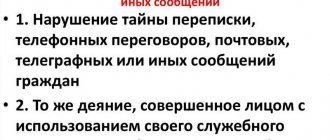ST 155 of the Criminal Code of the Russian Federation.
Disclosure of the secret of adoption against the will of the adoptive parent, committed by a person obliged to keep the fact of adoption as an official or professional secret, or by another person for mercenary or other base motives, is punishable by a fine of up to eighty thousand rubles or in the amount of wages. or other income of the convicted person for a period of up to six months, or compulsory work for a period of up to three hundred sixty hours, or correctional labor for a period of up to one year, or arrest for a period of up to four months with deprivation of the right to hold certain positions or engage in certain activities for a period of up to three years or without it.
Commentary to Art. 155 of the Criminal Code
1. The objective side consists of disclosing the secret of adoption against the will of the adoptive parent. Disclosure means disclosing confidential information about adoption to someone, regardless of the form of communication (oral, written).
The consent of the adoptive parent to the disclosure of the secret of adoption excludes criminal liability under Art. 155 of the Criminal Code. Consequently, if one spouse disclosed information against the will of the other spouse, the actions of the first spouse will fall under the elements of a crime under Art. 155 of the Criminal Code.
2. The elements of the crime are formal, the crime is recognized as completed from the moment the fact of adoption against the will of the adoptive parent is reported to at least one person.
3. A mandatory feature of the subjective side is a motive - selfish or other base motives, but provided that the act was committed by a person who is not obliged to keep the fact of adoption as an official or professional secret. If such an obligation exists, the person is held criminally liable regardless of the motivation for the behavior.
4. The subject of the crime includes two categories of persons: a) a special subject - a person obliged to keep the fact of adoption as an official or professional secret; b) general subject - a person who has reached the age of 16 years, who has divulged the secret of adoption for selfish or other base motives.
What is disclosure of the secret of adoption?
The Family Code of the Russian Federation in Article 139 provides that the fact of adoption of a child by a family is protected by law. Unfortunately, the RF IC does not explain the concept of secrecy of adoption. Only in 2015, the Constitutional Court dated June 16, 2015 No. 15-P gave some guidelines for what this category represents.
Important! The degree of confidentiality is determined by the parent himself. If the requirement for secrecy is not set by the adoptive parents, then the disclosure of such information is not subject to criminal punishment
Thus, when the following information is made public, liability arises:
- change of surname, name and patronymic;
- place and date of birth, which can also be changed at the request of the adoptive parents (it is established that the date of birth is adjusted within the range of three months);
- information about the court hearing at which the issue of changing the child’s status was decided;
- data on the provision of maternity leave instead of adoption leave;
- medical information about the child’s metrics;
- other information that adoptive parents do not want to disseminate.
Thus, in addition to the Family Code, the requirement to maintain the secrecy of the adoption of a child is contained in the norms of the Code of Civil Procedure of the Russian Federation (form of conducting a court hearing), legislation on acts of civil status (information on the issuance of a certificate with changed data of the child), legislation on the provision of medical activities ( metrics of the adopted child), the Labor Code of the Russian Federation (providing maternity leave) and, naturally, the Constitution (guarantees for adoptive parents of non-interference in personal and family secrets).
This constitutes the subject matter of the crime. Criminals are officials of these bodies.
If the parents have not established a regime of secrecy in relation to information about the appearance of a child in the family, then there is also a need to obtain their permission to disseminate such information. If a child, at the moment of “entering” the family, is able to realize that the parents are adoptive parents, then he also acts as a steward of the secret. For example, a minor does not want his peers to know that he does not live with his biological parents.
The corpus delicti under Article 155 of the Criminal Code of the Russian Federation assumes that the circle of persons in respect of whom information can be illegally provided is unlimited, that is, the child himself is included in this indefinite list of subjects. This unlawful act is characterized by direct intent. Since there is no material basis (deriving benefits), the crime is formal.
The legislator did not provide for differences in the ways in which the offender was able to disclose information (correspondence, oral conversation or the use of special means of communication will be punished equally).
https://youtube.com/watch?v=7mrkgXYX5H0%3Ffeature%3Doembed
Second commentary to Art. 155 of the Criminal Code of the Russian Federation
1. Disclosure of the secret of adoption means informing someone about the act of adoption or about measures taken in connection with this. It must be specific enough to identify the information received with specific individuals. It does not matter to whom this confidential information was transferred - the adopted child, his real parents, relatives, work colleagues, neighbors, classmates or fellow students, etc. The fact that the child knows the fact of his adoption does not exclude the responsibility of the person who divulged the secret of adoption.
In accordance with the law, disclosure of the secret of adoption is recognized as criminal if it is committed against the will of the adoptive parent.
2. The subjective side is characterized by direct intent. A mandatory feature is the motive for the crime - self-interest or other base motives. Persons obliged to keep the fact of adoption as an official or professional secret are subject to criminal liability regardless of the motives for their behavior.
3. The subject of the crime may be:
a) a person obliged to keep the fact of adoption as an official or professional secret, i.e. special subject (judges, persons who carried out state registration of adoption, employees of civil registry offices, employees of guardianship and trusteeship authorities, etc.);
b) a person who has reached the age of 16 years and has divulged the secret of adoption for selfish or other base motives.
What is it for
It is important to understand that disclosing the secret of adoption is fraught with the development of a negative atmosphere in the family, which can lead to divorce of spouses, cancellation of adoption or unlawful actions on the part of members of the family union. . Contrary to the Conventions on the Rights of Children, which opposes concealing the fact of adoption, as this is contrary to human rights
Contrary to the Conventions on the Rights of Children, which opposes concealing the fact of adoption, as this is contrary to human rights.
The secrecy of adoption can entail moral and legal problems, therefore in Russia a decision has been made on its non-disclosure in order to neutralize the threat of these problems arising.
The following procedures are also kept secret:
- protection from attempts to take the baby away from the foster family by his blood relatives;
- ensuring a comfortable climate in the family, relationships based on mutual understanding and love;
- protection from mental and moral ill-health of children in foster families, since often the news of the absence of family ties among family members can cause irreparable damage to the mental health of the child;
- protection from blackmail from third parties who exert pressure under the pretext of disclosing secrets;
- responsibility for disclosing the secret of adoption provides protection from the provision of information about the adoptive parents to the child’s biological parents, who “in time” came to their senses about their involvement in raising the child.
Modern trends in glasnost give the right to assume that, following the example of the West, the secrecy of adoption and the threat of its disclosure will soon be abolished in Russia. This measure will eliminate all obstacles to finding blood relatives if necessary.
What responsibilities are provided?
Criminal liability for disclosing information about adoption occurs after the disclosure has taken place. This crime belongs to the category of completed crimes and cannot be either ongoing or continued.
The Criminal Code of the Russian Federation establishes both primary and additional punishment for this category of case. The main ones include:
- penalties not exceeding 80 thousand rubles (can be replaced by the amount of salary for the last six months);
- compulsory work – no more than 15 days;
- correctional labor – no more than 12 months;
- arrest – no more than 4 months.
Additional penalties include a ban on holding positions or conducting certain activities for a period of no more than 3 years. Since the sanction of the article does not contain a punishment in the form of imprisonment, the imposition of an additional punishment in terms of the term coincides with the main one.
https://youtube.com/watch?v=GRqpfz5X8LE%3Ffeature%3Doembed
When can the secret of adoption be revealed? The Constitutional Court answered this question.
To prevent or diagnose hereditary diseases, to avoid marriages with blood relatives, it is necessary to know who, in fact, our relatives are. And if in an ordinary family you can find out about this from relatives and in most cases get the necessary information, then in families where children were adopted, this is impossible without the consent of the adoptive parents. At least that's how it used to be.
What has changed now? In fact, as long as the adoptive parents are alive, their consent is still required to disclose the secret of adoption. But the situation is completely different if they die.
On the one hand, the law establishes an indefinite ban on disclosing the secret of adoption
On the other hand, information about biological parents may be vital for their descendants. This means that refusal to provide such information may violate the rights of citizens.
For example, when we are talking about a possible marriage with a relative, because knowing some facts, this could be avoided, and therefore hereditary diseases could be prevented. Every person has the right to health care – this right is guaranteed by the Constitution. Both motherhood and childhood are protected. And if life and health depend on the availability of some information, then maybe in certain cases this information should become accessible?
In this regard, when issuing Resolution No. 15-P of June 16, 2015, the Constitutional Court of the Russian Federation recognized that Art. 139 of the Family Code of the Russian Federation and Art. 47 of the Law “On Acts of Civil Status” do not contradict the Constitution of Russia. The court noted that these provisions of the law do not in themselves prevent the receipt of the necessary information about adoption by court decision. True, descendants can receive it only after the death of the adopted child and adoptive parents. But such information can be provided only to the extent that is necessary for them to exercise their constitutional rights. This means that simply out of curiosity, it will not be possible to find out in detail who the ancestors were.
So, it turns out that the secret of adoption without the consent of the adoptive parents can be revealed, but certain conditions must be met:
1. The application for disclosure of the secret came from a descendant of the adopted person - outsiders will not be able to obtain this information. However, we should not forget that citizens can conduct their cases in court not only personally, but also through representatives. This means that in the interests of the child, his mother can apply, even if she is not a descendant of the child’s adopted ancestor. In addition, no one has canceled the opportunity to issue a power of attorney for representation in court.
2. The decision on whether to reveal the secret of adoption or not is made by the court - no one else has the right to assume such powers.
3. The adopted person and the adoptive parents have already died - it is this circumstance that makes it impossible for descendants to receive information from them.
4. Disclosure of the secret of adoption is necessary for descendants to exercise their constitutional rights. Do not forget that the right to information itself may be limited by law, as is the case with adoption. But the death of the adopted child and adoptive parents can be considered a special circumstance. And given that disclosing the secret of adoption may be necessary to respect the right to health care, the situation is somewhat different. But in any case, the final decision is up to the court.
5. Disclosure of the secret of adoption should not upset the balance of rights and responsibilities of other people related to adoption. If someone wants to find out information about their ancestors simply out of curiosity, then it is worth thinking about whether other relatives of their ancestors and the ancestors themselves want this? It is not for nothing that the secrecy of adoption was established - in order to balance the interests of the largest possible circle of people, because we are talking about a very delicate area of human relations.
And although while the adoptive parents are alive, only they can decide whether to divulge the secret of adoption or not, their descendants still have the opportunity to learn about their biological relatives.
In fact, the ban on disclosing the secrets of adoption was partially lifted. However, as always, good enforcement practices are of great importance. When going to court, the descendants of the adopted person will have to prove and justify the reasons why they would like to receive information about their ancestors.
What judicial practice shows
In judicial practice, this article is often found, since adoption is common in Russia. Anyone can reveal the secret. But more often, adoptive parents do not go to court because they do not know that there is criminal liability for this.
Examples of cases:
- Citizen E. worked in the guardianship and trusteeship authorities. They called him on the phone and identified themselves as a police officer, asking him to give information about the adoption of one of the children from a local official. E. did not know that he was being deceived, so he gave away the secret. Soon she became known to the media. The court began an investigation and found E. He confessed to his crime and admitted guilt. The investigation took this into account and sentenced him to a fine and compulsory labor due to the fact that E. was misled.
- Citizen G. adopted a little girl who was 9 months old, but she didn’t remember anything. Then G. got married without telling her husband anything about the procedure. One day, in the heat of a quarrel with her husband, she told him a secret, which came as a shock to him. He filed a lawsuit because his daughter also found out about this and fell into depression. G. was sentenced to community service and a fine of 20 thousand rubles for causing moral damage.
- Citizens P. and R. were married and adopted a boy from an orphanage. After 5 years they separated, the boy remained with his mother. During one of his meetings with his father, already at the age of 14, the boy learned that he was adopted. P. specifically told him this, trying to humiliate him and show that he did not owe him anything in terms of alimony. The mother filed a lawsuit because the disclosure was against her will and caused mental harm to the child. P. was arrested for 3 months and ordered to pay moral damages.
What decisions are made under Article 155?
The article is rarely made public, because a secret is a secret, no one wants to give it away. In 2021, there were 3 cases under this article, 1 case ended in correctional labor and 2 in compulsory labor.







